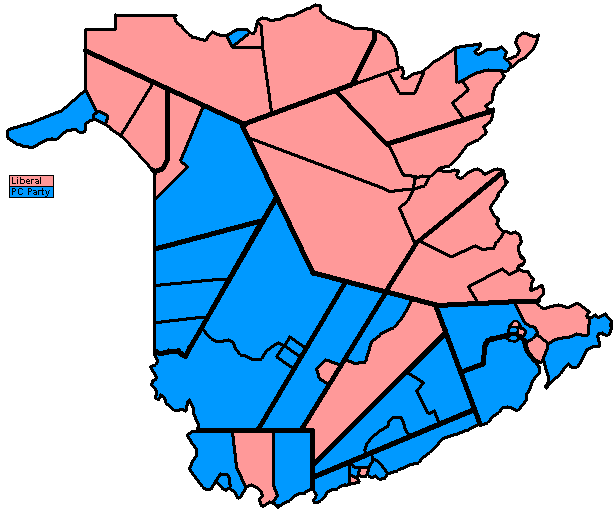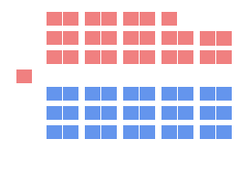
New Brunswick general election, 1978
Encyclopedia


49th New Brunswick Legislative Assembly
The 49th New Brunswick Legislative Assembly was created following a general election in 1978. It was dissolved on September 1, 1982.-Leadership:...
, the governing house of the province
Provinces and territories of Canada
The provinces and territories of Canada combine to make up the world's second-largest country by area. There are ten provinces and three territories...
of New Brunswick
New Brunswick
New Brunswick is one of Canada's three Maritime provinces and is the only province in the federation that is constitutionally bilingual . The provincial capital is Fredericton and Saint John is the most populous city. Greater Moncton is the largest Census Metropolitan Area...
, Canada
Canada
Canada is a North American country consisting of ten provinces and three territories. Located in the northern part of the continent, it extends from the Atlantic Ocean in the east to the Pacific Ocean in the west, and northward into the Arctic Ocean...
. Richard Hatfield
Richard Hatfield
Richard Bennett Hatfield, PC, ONB was a New Brunswick politician and long time Premier of the province .- Early life :...
's Progressive Conservative Party
Progressive Conservative Party of New Brunswick
The Progressive Conservative Party of New Brunswick is a centre-right political party in New Brunswick, Canada. It has its origins in the pre-Canadian confederation Conservative Party that opposed the granting of responsible government to the colony...
narrowly won its third term.
In the lead up to 1978, the Opposition Liberal Party
New Brunswick Liberal Association
The New Brunswick Liberal Association , more popularly known as the New Brunswick Liberal Party or Liberal Party of New Brunswick, is one of the two major political parties in the Canadian province of New Brunswick...
seemed destined to return to power. A number of scandals had been tied to the Conservatives and Liberal leader Robert Higgins
Robert J. Higgins
Robert J. Higgins is a supernumerary justice on the Court of Queen's Bench of New Brunswick and a former member of the Legislative Assembly of New Brunswick who served as the leader of the New Brunswick Liberal Party from 1971 to 1978....
was widely popular. In early 1978, Higgins believed he had tied some of the scandals directly to Hatfield himself. In a bold move, Higgins promised to resign should Hatfield prove that he was not tied directly to the scandal, which Hatfield promptly did. Higgins was forced to abruptly resign and was replaced by Joseph Daigle
Joseph Z. Daigle
Joseph Zenon Daigle, BA, BCL, QC born June 23, 1934 in Saint-Charles, New Brunswick, is a Canadian lawyer and a former politician and Chief Justice of New Brunswick....
as leader. The Liberals mused that Hatfield had purposely ensured false information was leaked to the Liberals to lead them into making false accusations.
Higgins' resignation created Hatfield's best chance to go to the polls. He called an election shortly after Daigle became Liberal leader. Despite the lack of a direct link to Hatfield, scandal remained tied to his government and a close election result was assured.
Hatfield's government was not entirely clean, however. The Liberals pointed to the Conservatives' budgets, which no longer maintained a surplus. The Bricklin
Bricklin SV-1
The Bricklin SV-1 was a gull-wing door sports car assembled in Saint John, New Brunswick, Canada. The body panels were manufactured in a separate plant in Minto, New Brunswick. Manufactured from 1974 until early 1976 for the U.S. market, the car was the creation of Malcolm Bricklin, an American...
failure was also fresh on voters' minds. While campaigning in anglophone
English language
English is a West Germanic language that arose in the Anglo-Saxon kingdoms of England and spread into what was to become south-east Scotland under the influence of the Anglian medieval kingdom of Northumbria...
sections of the province, Hatfield accused Daigle of being an anti-monarchist
Monarchy
A monarchy is a form of government in which the office of head of state is usually held until death or abdication and is often hereditary and includes a royal house. In some cases, the monarch is elected...
for supporting Pierre Trudeau
Pierre Trudeau
Joseph Philippe Pierre Yves Elliott Trudeau, , usually known as Pierre Trudeau or Pierre Elliott Trudeau, was the 15th Prime Minister of Canada from April 20, 1968 to June 4, 1979, and again from March 3, 1980 to June 30, 1984.Trudeau began his political career campaigning for socialist ideals,...
's constitutional reforms.
The result was the closest in New Brunswick history: the governing PCs won 30 seats to 28 for the opposition. The popular vote was very close: 146,719 votes were cast for Conservative candidates, and 146,596 for Liberals. In order to secure a workable majority following the election, Hatfield appointed Liberal Robert McCready
Robert McCready
Robert Black McCready was a restaurateur and political figure in New Brunswick, Canada. He was a member of the Legislative Assembly of New Brunswick, representing Queen's County from 1967 to 1974 as a Liberal member and then Queens South from 1978 to 1987 as a Progressive Conservative Progressive...
as speaker
Speaker (politics)
The term speaker is a title often given to the presiding officer of a deliberative assembly, especially a legislative body. The speaker's official role is to moderate debate, make rulings on procedure, announce the results of votes, and the like. The speaker decides who may speak and has the...
of the legislature, despite strong objections from McCready's Liberal colleagues; McCready went on to seek re-election as a Conservative and served in Hatfield's cabinet.
The Parti Acadien
Parti acadien
The Parti Acadien was a political party in New Brunswick, Canada, in the 1970s and 1980s. The party was founded in 1972 by Acadians who were upset over poorer living conditions in predominantly francophone areas of the province versus those areas dominated by anglophones...
had its best ever showing in the election, winning 12% of the vote in the ridings where it fielded candidates, and coming within 200 votes of electing Armand Plourde in Restigouche West
Restigouche West
Restigouche West was a provincial electoral district for the Legislative Assembly of New Brunswick, Canada. This riding was created in the 1973 redistribution when New Brunswick moved to single member districts from Bloc voting. It was merged with Madawaska-la-Vallée to form the new district of...
.
Results
| 1978 New Brunswick Election Results | ||||
|---|---|---|---|---|
| Party | Leader | Results | ||
| Seats | % of votes cast | |||
| Progressive Conservative Progressive Conservative Party of New Brunswick The Progressive Conservative Party of New Brunswick is a centre-right political party in New Brunswick, Canada. It has its origins in the pre-Canadian confederation Conservative Party that opposed the granting of responsible government to the colony... |
Richard Hatfield Richard Hatfield Richard Bennett Hatfield, PC, ONB was a New Brunswick politician and long time Premier of the province .- Early life :... |
30 | 44.39% | |
| Liberal | Joseph Z. Daigle Joseph Z. Daigle Joseph Zenon Daigle, BA, BCL, QC born June 23, 1934 in Saint-Charles, New Brunswick, is a Canadian lawyer and a former politician and Chief Justice of New Brunswick.... |
28 | 44.36% | |
| New Democratic | John LaBossiere John LaBossiere John LaBossiere was a Canadian politician, who served as leader of the New Brunswick New Democratic Party from 1976 to 1980. The party's first francophone leader, he was noted for making inroads into the province's Acadian community, taking the party to a then-record level of support in the 1978... |
0 | 6.48% | |
| Parti Acadien Parti acadien The Parti Acadien was a political party in New Brunswick, Canada, in the 1970s and 1980s. The party was founded in 1972 by Acadians who were upset over poorer living conditions in predominantly francophone areas of the province versus those areas dominated by anglophones... |
Jean-Pierre Lanteigne | 0 | 3.5% | |
| Independents | 0 | 1.27% | ||
| Total | 58 | 100.0% | ||

